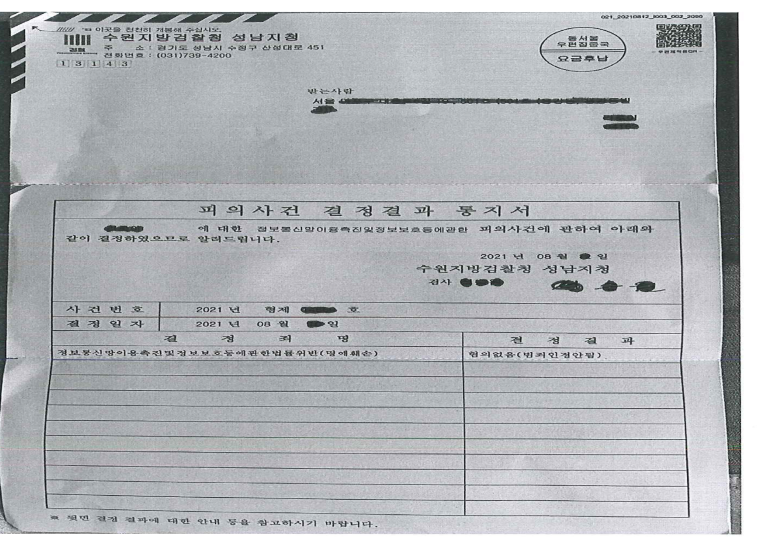승소사례
[승소] 정보통신망이용촉진및정보보호등에관한법률위반(명예훼손) 승소 사례 Network Act(Defamation) Winning Case
[업무분야] 민형사 일반
- 작성일 : 2021-08-19
- 조회수 : 11
SNS의 발달로 인터넷카페, Facebook, instagram 등에 타인을 비방하는 글을 올리는 경우 명예훼손이 성립될 수 있습니다.
요즘 유튜버 등으로 보험영업을 하시는 설계사분들도 많으신데 다른 설계사에 대한 비방이나 특정 보험회사 상품에 대한 부정적 내용을 설명하면 명예훼손으로 고소를 당할 수 있습니다.
맘카페에서 정보교환 차원에서 특정 학원에 대한 부정적 내용을 올리거나 물건 구입 후 댓글을 부정적으로 올려도 명예훼손으로 고소를 당합니다.
그런데 정통망법상 명예훼손을 '사람을 비방할 목적'이 필요한 범죄입니다.
따라서 명예훼손으로 고소를 당했을 때는 해당 글의 작성 목적이 무엇인지를 잘 살펴야 할 것입니다.

이 건은 개업하고 맡은 첫사건이었는데, SNS에 적시된 사실이 명예훼손이라고 고소된 피의자였습니다.
SNS 올린 글이 타인을 비방하는 글이라도, 글의 목적이 비방 목적이 없다는 점, 모임의 다른 멤버가 위험에 처해서 이를 방지하기 위함이라는 점을 잘 설명하여 혐의 없음(범죄인정안됨)의 처분을 최종적으로 받았습니다.
의뢰인이 한국법을 잘 모르는 외국인이라 한국에서의 경찰 조사에 큰 두려움이 있었으나
피의자 신문조서에서 의뢰인이 글을 올린 목적, 그 모임에서 의뢰인은 organizer 오히려 다른 멤버를 보호할 점이 있다는 점을 설명했는데 결과가 좋아서 보람됩니다.
아래는 명예훼손 관련 정통망법 내용과 관련 판례를 소개해 드리겠습니다. 의뢰인이 외국인이라 영어로 준비했던 내용이 있어 영어가 있는 그대로 올렸습니다. 부족한 영어실력이지만 외국인에게 대법원 판결 설명해주고 너무 걱정하지 말라고 위로해주었던 생각이 나네요
정통망법(Network Act, Act On Promotion Of Information And Communications Network Utilization And Information Protection, Etc.)
제70조(벌칙) ① 사람을 비방할 목적으로 정보통신망을 통하여 공공연하게 사실을 드러내어 다른 사람의 명예를 훼손한 자는 3년 이하의 징역 또는 3천만원 이하의 벌금에 처한다.
② 사람을 비방할 목적으로 정보통신망을 통하여 공공연하게 거짓의 사실을 드러내어 다른 사람의 명예를 훼손한 자는 7년 이하의 징역, 10년 이하의 자격정지 또는 5천만원 이하의 벌금에 처한다.
③ 제1항과 제2항의 죄는 피해자가 구체적으로 밝힌 의사에 반하여 공소를 제기할 수 없다.
Article 70 (Penalty Provisions)(1) A person who commits defamation of another person by disclosing a fact to the public through an information and communications network purposely to disparage the reputation of such person, shall be punished by imprisonment with labor for up to 3 years or by a fine not exceeding 30 million won.
(2) A person who commits defamation of another person by disclosing a false fact to the public through an information and communications network purposely to disparage the reputation of such person, shall be punished by imprisonment with labor for up to 7 years, by suspension of qualification for up to 10 years, or by a fine not exceeding 50 million won.
(3) The prosecution may not prosecute a person who committed a crime under paragraph (1) or (2) against the victim's will explicitly manifested.
대법원 2020. 12. 10 선고 2020도11471 판결도 아래와 같이 판결하였습니다.
‘사람을 비방할 목적’이란 가해의 의사와 목적을 필요로 하는 것으로서, 사람을 비방할 목적이 있는지는 드러낸 사실의 내용과 성질, 사실의 공표가 이루어진 상대방의 범위, 표현의 방법 등 표현 자체에 관한 여러 사정을 감안함과 동시에 그 표현으로 훼손되는 명예의 침해 정도 등을 비교⋅형량하여 판단하여야 한다. ‘비방할 목적’은 공공의 이익을 위한 것과는 행위자의 주관적 의도라는 방향에서 상반되므로, 드러낸 사실이 공공의 이익에 관한 것인 경우에는 특별한 사정이 없는 한 비방할 목적은 부정된다.
'The purpose of defamation requires the intention and purpose of the perpetrator, and the content and nature of the revealed facts, the scope of the other party for which the facts were announced, the method of expression, etc. In addition to considering various circumstances, the degree of infringement of honor damaged by the expression should be compared. Since the purpose of defamation is contrary to the public interest in the direction of the subjective intention of the actor, the purpose of defamation is denied if the facts revealed are about the public interest unless there are special circumstances..
여기에서 ‘드러낸 사실이 공공의 이익에 관한 것인 경우’란 드러낸 사실이 객관적으로 볼 때 공공의 이익에 관한 것으로서 행위자도 주관적으로 공공의 이익을 위하여 그 사실을 드러낸 것이어야 한다. 그 사실이 공공의 이익에 관한 것인지는 명예훼손의 피해자가 공무원 등 공인(公人)인지 아니면 사인(私人)에 불과한지, 그 표현이 객관적으로 공공성⋅사회성을 갖춘 공적 관심 사안에 관한 것으로 사회의 여론형성이나 공개토론에 기여하는 것인지 아니면 순수한 사적인 영역에 속하는 것인지, 피해자가 명예훼손적 표현의 위험을 자초한 것인지 여부, 그리고 표현으로 훼손되는 명예의 성격과 침해의 정도, 표현의 방법과 동기 등 여러 사정을 고려하여 판단하여야 한다. 행위자의 주요한 동기와 목적이 공공의 이익을 위한 것이라면 부수적으로 다른 사익적 목적이나 동기가 포함되어 있더라도 비방할 목적이 있다고 보기는 어렵다.
In this case, the fact that “if the facts disclosed is about the public interest” is objectively related to the public interest, and the actor must also subjectively reveal that fact for the public interest. The fact is related to the public interest is whether the victim of defamation is a public official, such as a public official, or is only a private person, and the expression is objectively related to a public concern with publicity and sociality ,or it is contributing to formation of public opinion or belonging to a purely private domain, or the victim has brought the risk of defamatory expression on its own, and it should be judged in consideration of the nature and degree of infringement of the honor damaged by the expression, the method and motivation of expression, etc. If the main motive and purpose of the actor is for the public interest, it is difficult to say that it has the purpose of defamation, even if other private purposes or motives are incidentally included.



